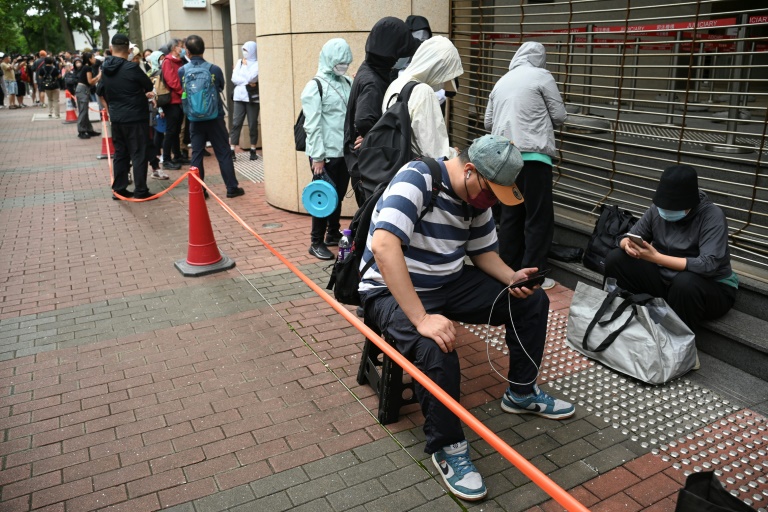14 Hong Kong democracy campaigners found guilty of subversion

People queue outside court in Hong Kong as it convenes to deliver verdicts in the city’s biggest case against pro-democracy campaigners since China imposed a national security law to crush dissent
Hong Kong – A Hong Kong court found 14 people guilty of subversion on Thursday in the biggest case against pro-democracy campaigners since China imposed a national security law to crush dissent.
The 14, along with 31 others who pleaded guilty, could face life in jail, with sentencing expected later this year.
Beijing imposed a national security law on Hong Kong in 2020 after huge and sometimes violent pro-democracy protests brought the finance hub to a standstill.
Authorities then charged 47 people from across a wide cross-section of society with subversion, saying their political activities were aimed at bringing down the government.
Sixteen defendants — including activists, former lawmakers and district councillors — had pleaded not guilty.
Judge Andrew Chan on Thursday named the 14 defendants who were found guilty. Two former district councillors were found not guilty.
A short summary of the verdict released by the court said the 14 had planned to undermine “the power and authority of both the Government and Chief Executive”.
“In our view… that would create a constitutional crisis for Hong Kong,” it said.
Most of the defendants had been kept behind bars since they were first brought to court in March 2021.
The trial was held without a jury and the judges were chosen from a pool of jurists handpicked by Hong Kong’s leader.
The 31 who pleaded guilty had done so hoping for lenient sentences.
Lawrence Lau, one of the defendants found not guilty, told reporters as he left the court to keep supporting the rest of the group.
“I hope that everyone will continue to (have) concern for our other friends in the case,” he said.
– ‘Show support’ –
Prosecutors said the 47 had conspired to subvert state power by holding unofficial primary polls, as part of their plan to form a majority in the legislature.
With control of the legislature, they would veto government budgets and force the city’s leader to accede to five key demands raised by protesters in 2019, the court heard.
Defence lawyers argued Hong Kong’s mini-constitution had laid out mechanisms for such a plan and that the matter was “a purely political issue rather than a legal matter”.
Outside the court Thursday, Kathy, one of the 610,000 voters who cast their ballots in the unofficial primary election in 2020, said she believed the defendants “never committed any crime”.
“For me, the primary election was simply an occasion to show my support for something I believe in,” she said, declining to provide her full name.
University student Lam said the primary election was a strategy “common in many places around the world”.
“I still can’t figure out how it can subvert the state, so I want to see how the court would rule on that,” he said.
Ahead of the hearing, well-known activist Alexandra Wong, also known as Grandma Wong, attempted to stage a protest before police moved her off across the street to a fenced-off area.
“Immediately release the 47!” she shouted, waving a British flag. “Support democracy, support the 47!”
The case has been closely watched by the international community, with diplomatic officers from the consulates of France, the European Union and Italy going to the court on Thursday.
The United States and other Western nations have criticised China for cracking down on democracy in Hong Kong and curtailing freedoms promised when the former British colony was handed over to Chinese rule in 1997.
In response to the 2021 arrests of the defendants, the United States had sanctioned six Chinese and Hong Kong officials.
Before Thursday, 114 people had been found guilty of crimes related to the national security law since it was introduced.
The case against the group of 47 was the biggest under the law.
